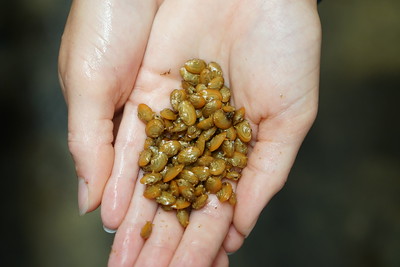Nick Blumenthal was an intern in the Harvard Law School Food Law and Policy Clinic during the summer of 2024.
In 2018, American agriculture found itself at the epicenter of a geopolitical storm. An escalating trade war between the United States and China, the world’s two largest economies, led to a barrage of tariffs that hit farmers particularly hard. From mid-2018 through 2019, the U.S. realized $27 billion in export loss, primarily to China, across 17 affected commodities as a result of regulatory tariffs. As China imposed steep tariffs on U.S. agricultural exports in response to broad tariffs first enacted by the Trump Administration—especially soybeans, pork, and dairy—farmers suddenly faced the daunting reality of losing their largest and most lucrative market. Prices plummeted, storage facilities overflowed with unsold commodities, and the rural heartland braced for economic turmoil. This abrupt and devastating disruption not only threatened the economic stability of rural communities but also underscored the fragility of an agricultural sector deeply intertwined with global trade dynamics. It was against this backdrop of economic turmoil and uncertainty that the U.S. government introduced the Market Facilitation Program (MFP), deploying the financial resources of the Commodity Credit Corporation (CCC) to cushion the blow for embattled farmers. This intervention not only underscored the vulnerabilities of American agriculture to global trade dynamics but also spotlighted the critical role of federal support in sustaining the agricultural economy. The MFP has since concluded in subsidizing farmers impacted by tariffs during the 2018 U.S.-China trade war; nevertheless, the statutory authority of the CCC to establish and implement similar initiatives continues.
In the ever-evolving landscape of American agriculture, the CCC stands as a pivotal instrument designed to support farmers and stabilize the agricultural economy. Established in 1933 amidst the Great Depression, the CCC’s foundational purpose was to stabilize prices and ensure farmers’ incomes were protected against market fluctuations. Operating under the umbrella of the U.S. Department of Agriculture (USDA), the CCC is uniquely funded through its borrowing authority from the U.S. Treasury, allowing it to deploy funds swiftly in response to agricultural needs.
The MFP, introduced in 2018, was a more recent innovation born out of a desire to minimize farmers experiencing increased economic instability resulting from the U.S.-China trade war. As tariffs and trade disruptions threatened the livelihoods of American farmers, the MFP provided direct financial relief, primarily to producers of commodities like soybeans and dairy, who were most affected by the loss of export markets. As the U.S. Department of Agriculture’s Farm Service Agency administered the MFP through funding allocated to the CCC, MFP’s direct payments were designed to mitigate the immediate financial distress caused by these geopolitical tensions.
Controversy has not eluded these programs. Critics argue that the distribution of MFP payments has disproportionately favored larger farming operations, leaving smaller, family-run farms at a disadvantage. Moreover, favorable payment rates were disproportionately directed towards farmers in the American South owned by affluent individuals and foreign-owned entities. Additionally, there are concerns about how these financial interventions might distort market signals, potentially leading to overproduction or changes in planting decisions based on anticipated subsidies rather than market demand. Budgetary sustainability is another point of contention, with questions arising about the continued reliance on CCC’s borrowing capacity and the broader impacts on the federal budget.
As the upcoming farm bill looms on the legislative horizon, the future role and funding mechanisms of the CCC are the subject of intense scrutiny and debate. In the context of the CCC and MFP, stakeholders are deeply divided. Some advocate for maintaining or even expanding these programs to provide ongoing support in an uncertain global market, while others call for significant reforms to ensure a more equitable and financially sustainable approach. As the farm bill provides the statutory authority for USDA to enact critical policies through the CCC (e.g., MFP), the specific language which will determine the guidelines to future applications of CCC funding is for debate.
Financially, the stakes are high. The continuation or modification of the CCC’s authority to fund the administering of programs such as the MFP could have far-reaching effects not only on farmers but also on taxpayers and the broader economy. Proponents of robust agricultural support emphasize the importance of securing the livelihoods of farmers who are often at the mercy of global market forces and climatic variances which influence American agricultural interests in international trade. However, fiscal conservatives and other critics argue for a more restrained approach, emphasizing the need for policies that encourage market resilience and reduce dependency on federal aid.
___
The views and opinions expressed on the FBLE Blog are those of the authors and do not necessarily reflect the official policy or position of FBLE. While we review posts for accuracy, we cannot guarantee the reliability and completeness of any legal analysis presented; posts on this Blog do not constitute legal advice. If you discover an error, please reach out to contact@farmbilllaw.org.

